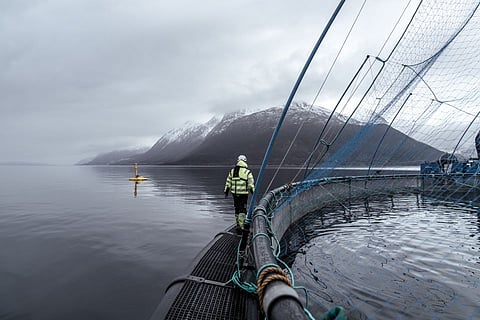

ISA has been detected at Måsøval's Fjølværet farming site in Frøya Municipality.
Photo: Måsøval AS / Sondre Marøy.
Måsøval is the latest Norwegian salmon farmer to be hit by a suspected outbreak of infectious salmon anaemia (ISA), the company has confirmed.
The ISA pathogen, a serious, contagious viral disease affecting salmonids, was detected during a routine screening at Måsøval's Fjølværet farming site in Frøya Municipality.
"Strict measures have been implemented to contain the virus and prevent further spread. Måsøval will harvest the site to reduce biological risk," the company said in a press statement.
Fish at the affected site numbered 396,000 with an average weight of 5.6 kg, the company said. Måsøval had originally planned to harvest these salmon during the last week in June, "thus the change in harvest plan will have limited effect on volumes and cost, and is expected to have little effect on price achievement," the company stated.
This latest suspected case of ISA comes after a string of similar incidents at various farming operations along the Norwegian coast.
According to Norwegian aquaculture monitoring site BarentsWatch, currently 14 farming locations have suspected or confirmed cases of the disease.
On 23 May, ISA was confirmed by the Norwegian Food Safety Authority Mattilsynet at a site run by Sjøtroll Havbruk in Sveio municipality, Vestland county, while two days earlier, the infectious disease was suspected at Nordlaks Havbruk farming site in Nordland county.
"This is a situation we take very seriously. Our highest priority is to protect the health of our fish and minimize the risk of spread. The fish at the Sandnes Øst location will be slaughtered as quickly as possible and we are working closely with the Norwegian Food Safety Authority on further work," said director of Nordlaks Havbruk, Bjarne Johansen, in a Nordlaks press statement.
ISA had also previously been suspected following detection at a SalMar facility in Frøya municipality, Trøndelag county on 30 April.
At sites with suspicion of ISA, the Norwegian authorities typically impose restrictions to limit the potential spread of disease, including banning movement of fish and roe between sites.
Once confirmed, an outbreak of ISA typically means immediate harvesting or culling of the affected fish, in line with Norwegian regulations. A restriction zone is also imposed around the affected areas, consisting of a protection zone and a monitoring zone, with limitations on traffic in the area around the site.
Such incidents can be highly costly for the farming companies involved, disrupting harvest plans and price achievement, as well as increasing operational costs for the affected sites.
Outside of Norway, ISA has also been recently detected in the Faroe Islands at a Bakkafrost facility, meaning the company must now harvest 1 million fish early.
